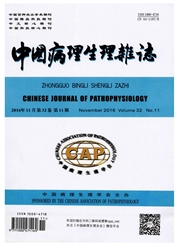

 中文摘要:
中文摘要:
目的:研究支原体感染对人类细胞株的核糖体新生肽链复合体( RNC)中 rRNA组成的影响及其相关机制。方法:分别提取支原体阳性与阴性RNC-RNA进行琼脂糖凝胶电泳,分析RNC-rRNA组成改变情况;在支原体污染环境中培养人正常肺上皮( HBE)细胞,比较培养前后RNC-rRNA的变化;对RNC-RNA条带异常细胞进行抗支原体治疗,比较治疗前后RNC-rRNA的变化。利用免疫印迹分析支原体污染对丝裂原活化蛋白激酶( mito-gen-activated protein kinase, MAPK)途径的影响。结果:不同组织来源的多株细胞中,支原体阴性和阳性细胞RNC-RNA的琼脂糖电泳显示细胞中RNC-rRNA组成发生异常改变,主要体现为28S和18S真核rRNA的降低,以及16S和未知原核rRNA的增加。在污染环境中培养HBE细胞,其RNC-rRNA组成可由支原体阴性转变为阳性谱型。以环丙沙星抗支原体治疗可逆转上述RNC-rRNA谱型的改变。总蛋白和磷酸化蛋白的免疫印记结果表明,支原体污染显著抑制A549细胞的p38 MAPK途径的活化,而对该细胞的ERK1/2途径无显著改变。结论:支原体感染可通过抑制p38 MAPK活化严重改变人类细胞株中RNC-rRNA的组成,从而影响宿主细胞的翻译行为。
 英文摘要:
英文摘要:
AIM:To evaluate the effect of mycoplasma on the rRNA composition of mature ribosomes in human cell lines.METHODS:We isolated ribosome nascent-chain complex ( RNC) from multiple mycoplasma-positive-negative human cell lines.RNC-RNA was acquired from each cell line through RNA extraction, followed by agarose gel separation, fluorescent visualization and gray-scale value measurements on the rRNA bands.Western blot analysis was performed to in-vestigate the MAPK pathway alterations.RESULTS:In various human cell lines derived from different tissues, we found that as compared with mycoplasma-negative cells, mycoplasma-positive cells showed aberrant RNC-rRNA band patterns, featured by the decreases in 28S and 18S eukaryotic rRNAs and the increases in 16S and other unknown prokaryotic rRNAs.When cultured without ciprofloxacin, mycoplasma-negative HBE cells acquired mycoplasma contamination as ob-served with such characteristic abnormal rRNA bands.The ciprofloxacin treatment was able to recover the RNC-rRNA bands of the mycoplasma-contaminated cells to the normal pattern.The results of Western blot analysis on total and phos-phorylated proteins indicated that p38 pathway was significantly deactivated in mycoplasma-infected A549 cells, while ERK1/2 pathway was not significantly altered.CONCLUSION:Mycoplasma contamination severely alters the RNC-rRNA composition via p38 MAPK pathway, thus seriously impacting on the host cell translational behaviors.
 同期刊论文项目
同期刊论文项目
 同项目期刊论文
同项目期刊论文
 期刊信息
期刊信息
